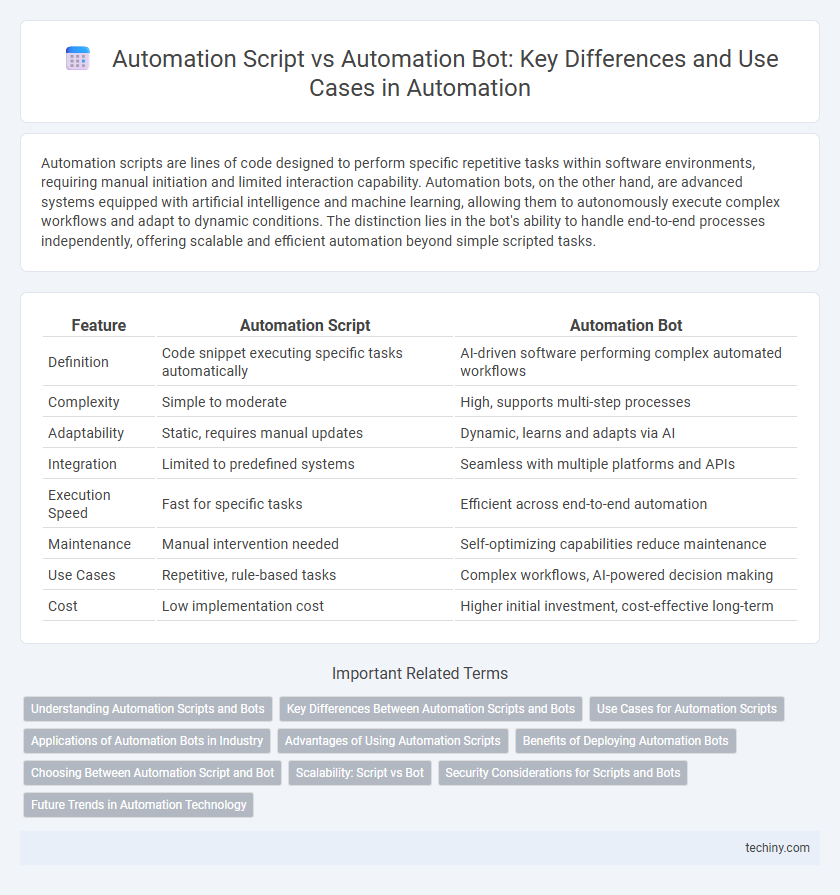Automation scripts are lines of code designed to perform specific repetitive tasks within software environments, requiring manual initiation and limited interaction capability. Automation bots, on the other hand, are advanced systems equipped with artificial intelligence and machine learning, allowing them to autonomously execute complex workflows and adapt to dynamic conditions. The distinction lies in the bot's ability to handle end-to-end processes independently, offering scalable and efficient automation beyond simple scripted tasks.
Table of Comparison
| Feature | Automation Script | Automation Bot |
|---|---|---|
| Definition | Code snippet executing specific tasks automatically | AI-driven software performing complex automated workflows |
| Complexity | Simple to moderate | High, supports multi-step processes |
| Adaptability | Static, requires manual updates | Dynamic, learns and adapts via AI |
| Integration | Limited to predefined systems | Seamless with multiple platforms and APIs |
| Execution Speed | Fast for specific tasks | Efficient across end-to-end automation |
| Maintenance | Manual intervention needed | Self-optimizing capabilities reduce maintenance |
| Use Cases | Repetitive, rule-based tasks | Complex workflows, AI-powered decision making |
| Cost | Low implementation cost | Higher initial investment, cost-effective long-term |
Understanding Automation Scripts and Bots
Automation scripts are sets of coded instructions designed to perform specific repetitive tasks within software environments, enabling precise control and customization for workflow optimization. Automation bots, unlike scripts, operate as autonomous agents capable of executing complex sequences across multiple systems and interacting dynamically with users or applications. Understanding the distinct roles of scripts and bots is crucial for selecting appropriate automation solutions that enhance efficiency and scalability in business processes.
Key Differences Between Automation Scripts and Bots
Automation scripts are sets of coded instructions designed to perform specific, repetitive tasks within software applications, typically requiring manual initiation or scheduling. Automation bots, on the other hand, are autonomous software agents capable of interacting with multiple systems and adapting to dynamic environments using AI and machine learning algorithms. Key differences include the bots' ability to execute complex workflows, self-learn, and operate without constant human intervention, whereas scripts are limited to predefined, static processes.
Use Cases for Automation Scripts
Automation scripts excel in repetitive, rule-based tasks such as data extraction, file management, and system monitoring, enabling efficient execution without human intervention. These scripts are highly customizable, allowing integration with various software applications to automate workflows like report generation and email notifications. Use cases often include batch processing, data validation, and scheduled task automation, making automation scripts invaluable for improving operational efficiency in IT and business environments.
Applications of Automation Bots in Industry
Automation bots are widely used in industries for executing repetitive tasks, such as data entry, order processing, and customer service, significantly reducing human error and operational costs. Unlike simple automation scripts, these bots integrate artificial intelligence and machine learning to adapt to complex environments and provide real-time decision-making. Key applications include supply chain management, predictive maintenance, and robotic process automation (RPA), accelerating digital transformation and enhancing productivity across sectors.
Advantages of Using Automation Scripts
Automation scripts offer precise task customization and easy scalability, enabling businesses to streamline repetitive processes efficiently. These scripts require minimal system resources compared to automation bots, reducing operational costs and enhancing performance. Their flexibility allows seamless integration with existing workflows, boosting productivity and ensuring consistent results across various automation tasks.
Benefits of Deploying Automation Bots
Automation bots enhance operational efficiency by executing complex tasks with higher accuracy and speed compared to traditional automation scripts. They enable real-time decision-making through AI integration and can self-adapt to changing workflows, reducing the need for manual intervention and ongoing maintenance. Deploying automation bots also improves scalability and offers advanced analytics, leading to optimized resource allocation and increased productivity across diverse business processes.
Choosing Between Automation Script and Bot
Choosing between an automation script and an automation bot depends on the complexity and scalability of the task. Automation scripts are ideal for simple, repetitive tasks requiring minimal maintenance and customization, while automation bots excel in handling complex workflows, integrating AI capabilities, and adapting to dynamic environments. Considering factors such as task frequency, required intelligence, and integration needs ensures the right automation solution for efficient process optimization.
Scalability: Script vs Bot
Automation scripts offer limited scalability due to their dependency on static code and manual maintenance, making it challenging to adapt to dynamic workflows or increased workloads. Automation bots, equipped with artificial intelligence and machine learning capabilities, scale efficiently by autonomously handling complex tasks across multiple systems without constant human intervention. This adaptability enables bots to optimize resource allocation and improve operational throughput, making them ideal for large-scale automation deployments.
Security Considerations for Scripts and Bots
Automation scripts often present security risks due to hardcoded credentials and lack of encryption, making them vulnerable to unauthorized access and data breaches. Automation bots typically incorporate advanced security protocols such as user authentication, encrypted communication, and real-time monitoring to mitigate these risks. Implementing regular security audits and access controls is essential for both scripts and bots to protect sensitive information and maintain system integrity.
Future Trends in Automation Technology
Automation bots are evolving beyond simple script execution, integrating artificial intelligence to enable adaptive decision-making and real-time process optimization. Automation scripts, while still fundamental for task-specific workflows, are increasingly supplemented by bots that offer scalable, self-learning capabilities across complex environments. Future trends emphasize the convergence of AI-driven bots with robotic process automation (RPA), fostering intelligent automation ecosystems that enhance efficiency and reduce operational costs.
Automation Script vs Automation Bot Infographic

 techiny.com
techiny.com